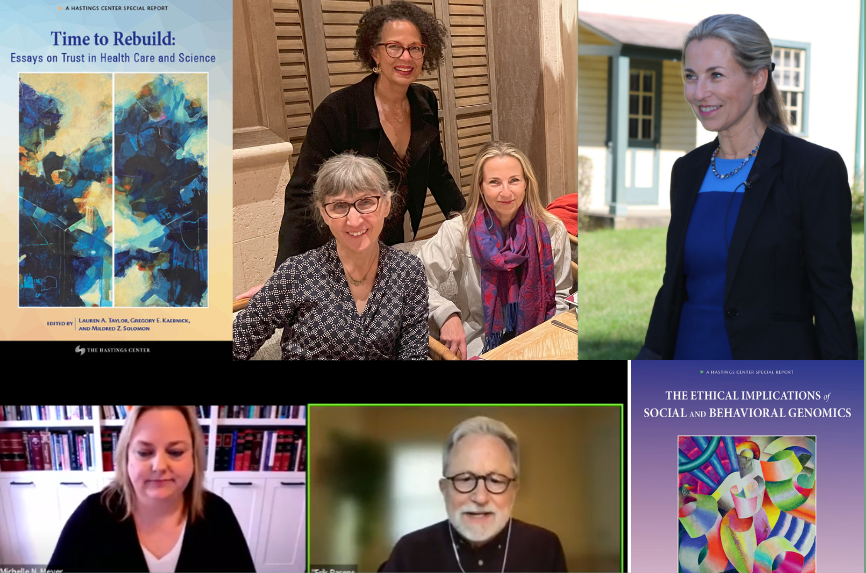2023 – A Year of Transformation
This year was full of transformations—celebration of past accomplishments and building toward the future. The Hastings Center had a changing of the guard, welcoming Vardit Ravitsky as our new president in September and thanking Mildred Solomon for 11 years of leadership. Ravitsky brings a global perspective, expertise on issues including the ethics of emerging biotechnologies and of artificial intelligence, and big plans for the Center and the field of bioethics.
The year began with the report of a “success story” in the national effort to vaccinate the U.S. public—especially medically underserved patients—against Covid. The report was written by Hastings Center research scholar Carolyn P. Neuhaus, senior research scholar Nancy Berlinger, and research associate Danielle Pacia, with colleagues at Albany Medical College and SUNY Upstate Medical University. Their findings grew out of a project supported by The Hastings Center’s Gil Omenn & Martha Darling Fund for Trusted and Trustworthy Scientific Innovation.
February opened up the opportunity for minority doctoral students to apply for our third cohort of Sadler Scholars, a select group of doctoral students with research interests in bioethics who are from racial or ethnic groups underrepresented in disciplines relevant to bioethics. Stipends for Sadler Scholars are provided by the Blair and Georgia Sadler Fund for Socially Just Health Policy.
April brought a landmark consensus report, Wrestling with Social and Behavioral Genomics: Risks, Potential Benefits, and Ethical Responsibility. It made recommendations for the responsible conduct of and communication about controversial research on the genetic contributions to human social and behavioral characteristics. Editors Erik Parens and Michelle N. Meyer joined with several authors of the report for a public discussion of their recommendations.
A three-part series in Hastings Bioethics Forum had an impact on hospital practice. The series (here, here, and here) describes concerns about the quality of hospital ethics services after the Joint Commission—which accredits U.S. hospitals—decided to eliminate the standard for clinical ethics services. The series generated pushback against the decision and the Joint Commission announced that it was restoring the clinical ethics standard.
During the hot days of summer, our work on artificial intelligence and ethics heated up. We launched a series of webinars on AI and caregiving, health care, and well-being. Vardit Ravitsky joined the steering committee of the National Academy of Medicine’s AI Code of Conduct Initiative, which aims to ensure the safe, ethical, reliable, and equitable use of artificial intelligence in health, medical care, and health research. Ravitsky is an investigator on two major projects on the ethics of AI in biomedicine, funded by the National Institutes of Health. Gregory Kaebnick, editor of the Hastings Center Report, led the development of recommendations on the responsible use of generative AI tools by scholarly journal authors, reviewers, and editors.
In September, in addition to welcoming our new president, we also welcomed a new research scholar, Virginia A. Brown, whose work centers on social justice and population health. Senior research scholar Karen J. Maschke spoke out about an experimental feat–the second transplant of a pig heart into a dying patient in an effort to prolong his life. Maschke is a principal investigator of a major project that will provide ethical and policy guidance on xenotransplantation clinical trials.
We closed the year with a focus on rebuilding trust in health care and science. The Hastings Center published a special report, Time to Rebuild: Essays on Trust in Health Care and Science, which delivers a series of findings for public officials, physicians, and scientists seeking to rebuild trust with patients and the public. Several of the authors and editors discussed takeaways in a public event, showing a path forward to heal our fractured society.
Much of the research and recommendations described above attracted coverage in leading media outlets, including the New York Times, Wall Street Journal, Boston Globe, ABC News, NBC Nightly News, Wired, Forbes, MIT Technology Review, Scientific American, and Science.
The work of The Hastings Center is made possible by generous donors like you. Philanthropy supports about 45% of our efforts to respond to the most pressing ethical challenges confronting society today. Will you help advance our mission with a gift this year? Learn more and make a donation.

